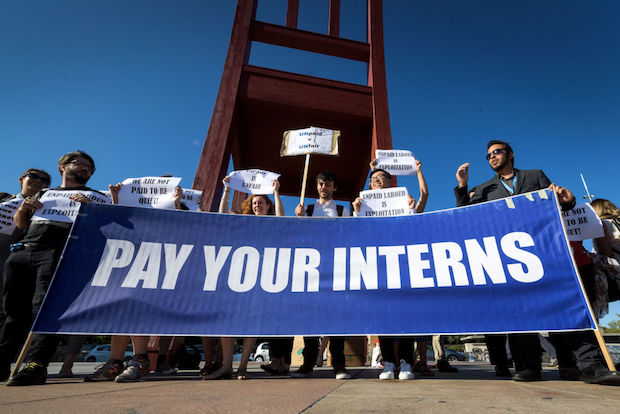Three quarters of people back the banning of unpaid internships beyond a four-week period. This is according to a survey of 5,000 people by the Social Mobility Commission.
Later this week Lord Holmes of Richmond will be leading a bill in the House of Lords with the aim of requiring companies to pay interns the minimum wage after a month’s work. This follows the same recommendation that was made in January in a report by the All Parliamentary Group on Social Mobility.
It will need Parliamentary backing to succeed – but this may be unlikely, given that Parliament blocked a ban on unpaid internships last November.
I am the founder of a womenswear brand, Rose & Willard. No one works at my company for free. It is simply the right thing to do but not just for ethical reasons. The counter argument for not paying interns is that it raises company costs at a time when they are already having to absorb higher labour costs (rising National Minimum Wage, auto pension enrolment) as well as increased business rates and the impacts of a weaker currency.
Of course, having free interns is the cheaper option, but that doesn’t make it the better one. There are downsides. The availability of a free resource on an indefinite basis can only lead to the waste of that resource. If we don’t pay for something, why would we value it or try to make the most of it? The most likely outcome is that companies simply ‘hire’ more people than they need. Why not, if it costs nothing?
This is why unpaid interns tend to spend an inordinate amount of time doing tasks such as making cups of tea and running errands. Simply to fill the time. This has the effect of lowering company productivity, but it also makes it much more difficult to identify talent. Plus, there’s the increased risk of infighting as multiple interns compete to bag the best experience.
If a company has to pay for a resource it will rationalise consumption. This will result in a more selective hiring process based on a more considered job description. Quite simply, companies would only hire when they actually needed to. Getting that right would raise productivity and strengthen the team – the more cost-effective solution overall.
In my experience, paid interns are also more motivated. This makes sense. If they are paid and given worthwhile tasks, they will feel valued and personally invested in the business. A genuinely symbiotic relationship. If a person isn’t paid for their work, not only are they less likely to care but they are also more likely to be resentful – a situation that is not going to raise a company’s performance.
On top of all of this – and what must not be overlooked – is that paying interns would help to increase the diversity of a company’s workforce. Unpaid internships, by definition, become economically self-selecting. Thus, BAME candidates, who are less likely to have financial support, end up being excluded from the process. This could be a good starting point in helping to address issues raised in the government’s Race Disparity Audit.
We live in an age where social divisions seem to grow ever wider. Young people are weighed down by student debt and have little hope of securing a foothold on the property ladder. It is a further indignity to suggest that they should also work for free and in a job that may offer them little benefit to their CVs.
While I admire the Parliamentary initiatives, I am not sure that the calls for a month-long, free period is viable. It may just speed up the churn. Companies will recruit unpaid interns up to the time limit and then replace them in order to avoid costs. This will leave candidates in a potentially worse situation, as multiple short work periods won’t allow for any proper experience to be acquired. A spotty CV also tends to be looked upon unfavourably by future employers.
The irony to all of this is that it is the large companies that can afford to pay that are the ones that opt for free labour. Interns are more willing to accept their lot with these companies for the sake of a distinguished brand name on their CV.
After the Harvey Weinstein allegations, Tom Hanks has called for a film and television industry code of ethics. I would ask that this code extend to include all industries and all forms of exploitation. Let’s pay our interns.
Heidy Rehman is the founder & CEO of Rose & Willard (www.roseandwillard.com)





Comments